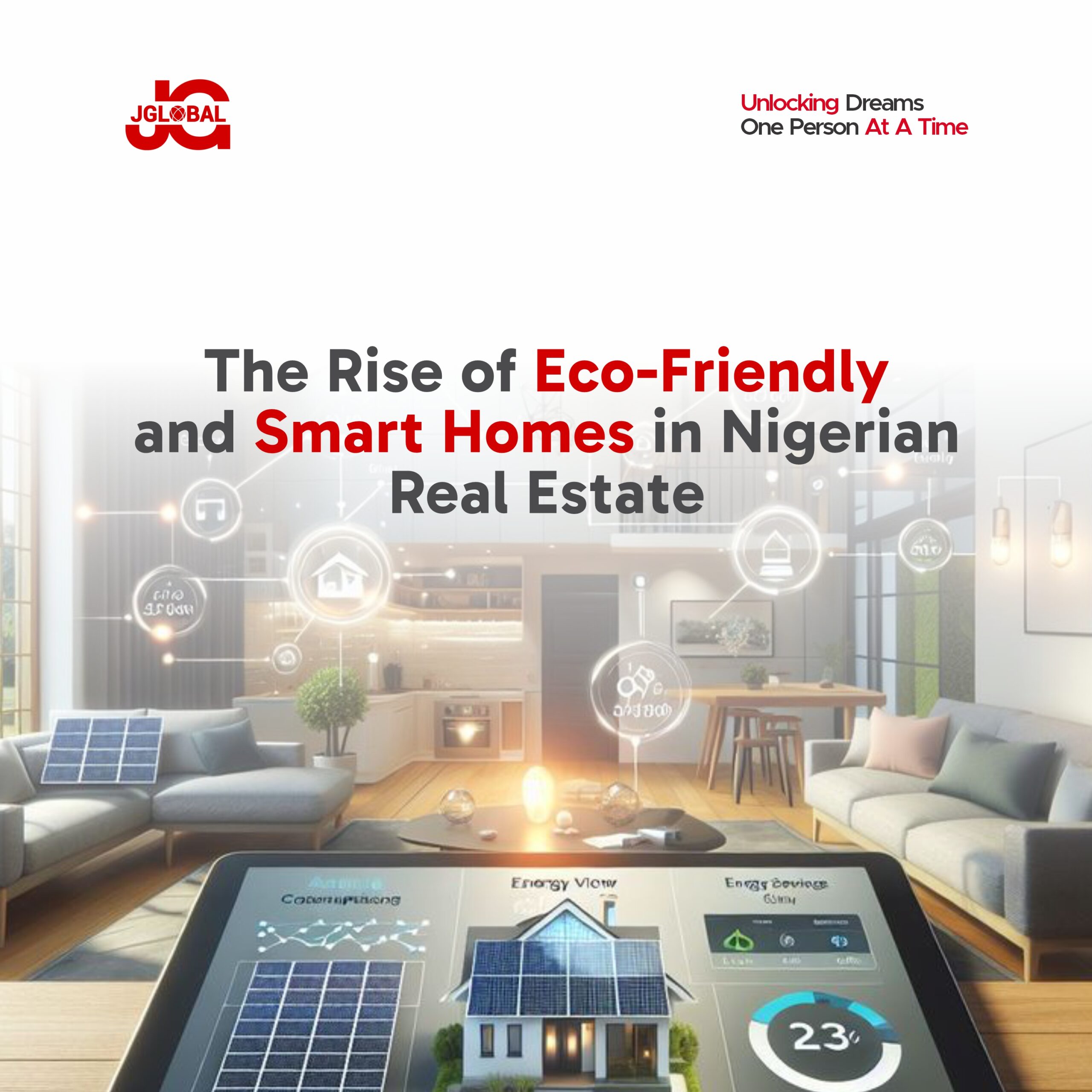THE RISE OF ECO-FRIENDLY AND SMART HOMES IN NIGERIAN REAL ESTATE

INTRODUCTION
Nigeria’s real estate market has experienced significant growth in recent years, driven by a rapidly expanding population, urbanization, and economic development. However, this growth has also led to increased environmental concerns, such as energy consumption, waste management, and pollution.
The rise of eco-friendly and smart homes isn’t just a trend, it’s an economic opportunity, a blueprint for sustainable urban living. According to recent studies, green buildings can reduce energy consumption by up to 30-40% compared to traditional structures. For Nigerian homeowners and Investors, this means a significant long-term savings.
Real estate developers are taking note. They are not left out of this growth. In fact they are keen on bringing it to life. Forward-thinking companies are incorporating green technologies and smart home features as key selling points. This isn’t just about meeting current demand, it’s about future-proofing investments.
What are Eco-Friendly Homes?
An eco-friendly home, also known as a green home/building, is a type of house that is designed, built, and operated to minimize its impact on the environment. Eco-friendly homes incorporate sustainable materials, energy-efficient systems, and innovative designs to reduce waste, conserve energy, and promote healthy living.
What are Smart Homes?
A smart home is a house that incorporates advanced technology and automation systems to provide occupants with a convenient, comfortable, and energy-efficient living space. Smart homes use sensors, algorithms, and Internet of Things (IoT) devices to control and monitor various aspects of the home, such as lighting, temperature, security, and entertainment.
Smart homes are no longer the stuff of science fiction. They are becoming a reality in urban centers like Lagos, Abuja, and Port Harcourt.
What Makes a Home “Smart”?
- Automated Systems: Imagine controlling your home’s lighting, security, and temperature with a smartphone app. Smart homes offer unprecedented convenience and efficiency.
- Energy Management: Intelligent systems that optimize energy consumption, automatically turning off unused appliances and managing power distribution in your house.
- Enhanced Security: Advanced security systems with real-time monitoring, remote access, and AI-powered threat detection.
What are the Benefits of Eco-Friendly and Smart Homes?
In Nigeria, eco-friendly and Smart homes offer numerous benefits, including but not limited to:
- Improved health and well-being: Eco-friendly homes promote better indoor air quality, natural lighting, and ventilation, leading to improved health and well-being.
- Increased property value: Eco-friendly homes are becoming increasingly desirable, leading to higher property values and potential long-term investment returns.
- Enhanced convenience and comfort: Smart home systems can control lighting, temperature, security, and entertainment systems remotely, making life easier and more convenient.
- Improved energy efficiency: In a country where electricity can be unpredictable, these innovations are more than just a luxury – they’re a necessity. Eco-friendly and Smart home systems can optimize energy consumption, reducing waste and lowering energy bills.
- Increased property security: Smart home security systems can detect and respond to potential security threats, providing an added layer of protection for homeowners and their families.
- Climate Adaptation: Nigeria’s diverse climate, ranging from tropical in the south to semi-arid in the north, demands innovative housing solutions. Eco-friendly homes are designed to maintain comfortable temperatures, reduce heat absorption, and minimize reliance on energy-intensive cooling systems.
Challenges of Eco-friendly and Smart Homes Adoption
While eco-friendly and smart homes offer numerous benefits, there are challenges to widespread adoption in Nigeria. These include:
- Higher upfront costs: Eco-friendly and smart home technologies can be more expensive than traditional building materials and systems.
- Limited awareness and education: Many Nigerians are unaware of the benefits and opportunities offered by eco-friendly and smart homes.
- Infrastructure and regulatory challenges: Not all infrastructure and regulatory frameworks are fully supportive of eco-friendly and smart home technologies.
Despite these challenges, there are opportunities for growth and innovation in Nigeria’s eco-friendly and smart home market. These include:
- Government incentives and policies: Governments should offer incentives and policies to encourage the adoption of eco-friendly and smart home technologies.
- Private sector investment and innovation: Private sector companies should invest in research and development, driving innovation and reducing costs.
- Public awareness and education campaigns: Public awareness and education campaigns can help raise awareness and drive demand for eco-friendly and smart homes.
CONCLUSION
The rise of eco-friendly and smart homes in Nigerian real estate is a positive trend that offers numerous benefits for homeowners, the environment, and the economy. While there are challenges to widespread adoption, there are also opportunities for growth and innovation. As Nigeria’s real estate market continues to evolve, it’s essential that we prioritize sustainability, innovation, and environmental responsibility. By embracing eco-friendly and smart home technologies, we can create a better future for ourselves, our children, and our planet.
Stay informed, stay innovative, and let’s build a sustainable future – one smart home at a time.




[…] Read our blog on the Rise of Eco-friendly homes and smart homes […]